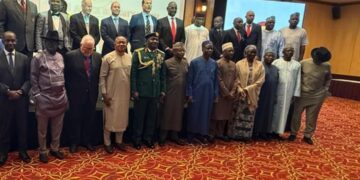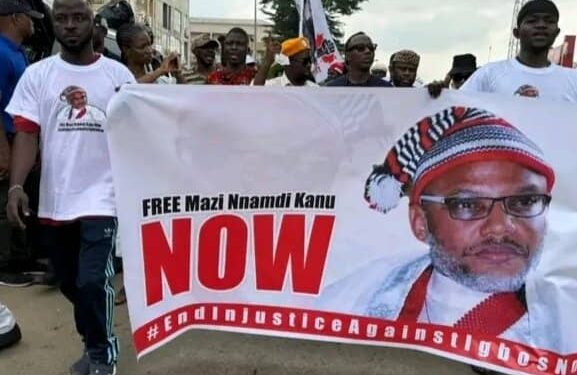In what many observers describe as the largest pro–Nnamdi Kanu demonstration in recent years, protesters in Abuja on Monday defied heavy police presence to demand the release of the detained leader of the Indigenous People of Biafra (IPOB).
Security operatives responded with tear gas, water cannons, and armoured vehicles, dispersing hundreds of protesters who had gathered near the Unity Fountain and attempted to march towards the Three Arms Zone.
By midday, the protests had caused major traffic gridlocks, with several roads around Shehu Shagari Way, Maitama, and the Central Business District blocked either by demonstrators or by security cordons.
Police Response and Arrests
According to eyewitness videos and independent media reports, dozens of protesters were arrested and loaded into police trucks during the demonstration.
Among those detained were Nnamdi Kanu’s younger brother and a legal representative accompanying him. Human rights advocate Omoyele Sowore, who was present at the scene, alleged that security operatives fired live rounds and beat several protesters.
International wire agencies Reuters and AP News both confirmed that police used tear gas and made multiple arrests, while no fatalities had been independently verified at the time of filing this report.
An AFP photojournalist covering the protest was briefly detained, and his camera equipment was reportedly destroyed before his release — a development that drew swift criticism from press freedom groups.
Social Media Footage Corroborates Crowd Dispersal
Citizen videos posted on X (formerly Twitter), YouTube, and Instagram show thick plumes of tear gas and protesters fleeing as security vehicles advanced.
In several clips, uniformed operatives can be seen using water cannons to break up groups chanting “Free Nnamdi Kanu Now!”
While some footage captured the sound of gunfire, DefenceTimesNG could not verify the use of live ammunition or confirm any casualties as of Monday evening.
A regional outlet citing eyewitness accounts claimed that “over 20 people sustained injuries,” though hospitals in the Federal Capital Territory had not released official casualty figures by press time.
Legal Context and Government Position
Security agencies justified their response by referencing an interim Federal High Court injunction restricting protests near sensitive government zones, including the Presidential Villa, National Assembly, and Police Headquarters.
Authorities reiterated that citizens retain the right to peaceful assembly but warned that “unauthorized convergence around critical infrastructure will not be tolerated.”
Broader Security and Political Implications
The demonstrations coincided with the fifth anniversary of the #EndSARS movement, evoking memories of the 2020 youth-led protests that were violently suppressed.
Security analysts note that the renewed mobilization around Nnamdi Kanu’s continued detention could rekindle separatist tensions in the Southeast and stretch internal security resources already tasked with combating banditry and insurgency.
Observers warn that the use of excessive force risks fueling anti-government sentiment and could be exploited by extremist groups to destabilize already fragile regions.
Regional Solidarity and Alerts
Smaller solidarity gatherings were reported in Lagos, Enugu, and Port Harcourt, with police deploying in advance to prevent escalation.
The U.S. Embassy and several foreign missions in Abuja issued security advisories warning citizens to avoid large gatherings and potential flashpoints.
Current Status
By 8:00 PM (WAT), security forces had cleared major intersections in Abuja, though isolated standoffs continued in parts of the Central Area.
As of press time:
-
Arrests: Estimated 40–50 confirmed.
-
Injuries: Unverified reports of 20+.
-
Fatalities: None officially reported.
Authorities have yet to issue a comprehensive statement on the total number of detainees or the conditions of those injured.
DefenceTimesNG Analysis
The 20 October demonstration underscores the fragile intersection between civic dissent and national security in Nigeria’s democracy.
While the protests were largely peaceful in intent, the state’s firm response — particularly the alleged use of live rounds — exposes the enduring distrust between citizens and security institutions.
As the situation evolves, DefenceTimesNG will continue to monitor official briefings, medical reports, and follow-up protests in other regions.
Reporting by: DefenceTimesNG Staff Correspondents in Abuja and Lagos
Sources: AP, Reuters, Channels TV, ICIR Nigeria, Citizen Media, Social Video Archives.







